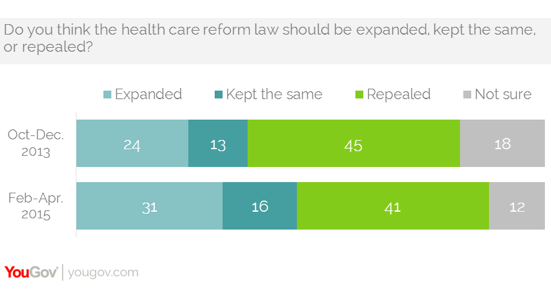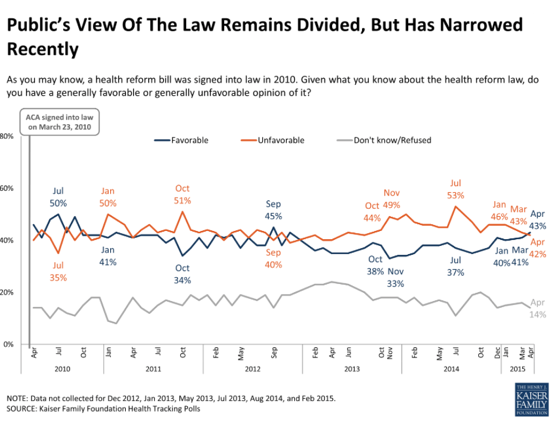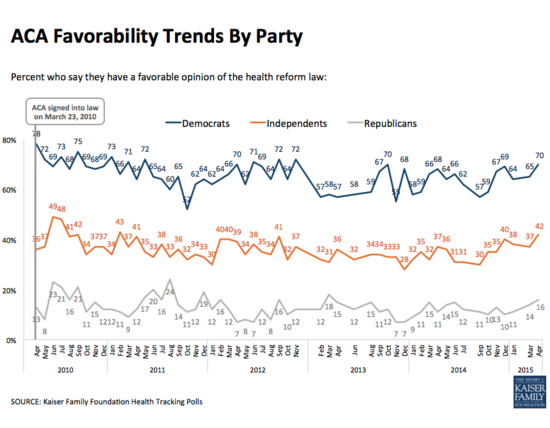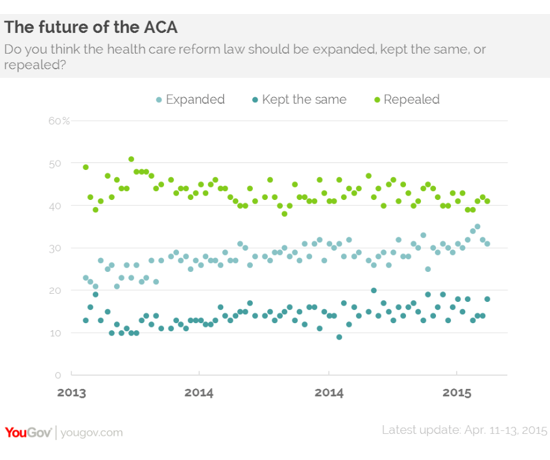
Favorable impressions of President Barack Obama's Affordable Care Act have increased slightly in recent months, showing the highest positive rating in a key tracking poll since the autumn of 2012.
While the change is small, the reasons behind it hint at shifts in the political environment that may foreshadow better news for the ACA in the months and years to come.
The latest monthly survey conducted by the Kaiser Family Foundation finds 43 percent of Americans reporting a favorable opinion on the "health reform bill signed into law in 2010." Forty-two percent reported having an unfavorable opinion, and 14 percent said they were unsure.
While some headlines emphasized the nominally net positive rating, "the [1-point] difference is within the survey’s margin of sampling error and is not statistically significant," according to Kaiser's report.
Far more important is the trend that shows views of the ACA narrowing to what the Kaiser analysts described as "the closest margin in over two years." Where negative views exceeded positive views by an average of 10 percentage points in KFF tracking during 2014 (47 to 37), the two categories have essentially drawn even over the past several months. This change represents a gain of roughly 5 percentage points in favorable opinions about the health care law as compared to those measured by the Kaiser Foundation surveys, on average, during 2014.
Two caveats about these modest trends. First, it's possible that they simply represent a "regression to the mean" of perceptions of the law -- that is, a regression to the days before the notoriously flawed rollout of the Healthcare.gov website in October 2013. Prior to that, ratings of the law had averaged 40 percent favorable and 43 percent unfavorable in Kaiser's monthly surveys.
Second, the recent shifts have not altered the broad partisan divide, arguably the most important characteristic of public opinion regarding the health care law. In the latest survey, 70 percent of Democrats expressed a favorable opinion of the ACA compared to just 16 percent of Republicans, with independents in between at 42 percent. While the favorable ratings have increased slightly across all three groups, the pattern of partisanship has remained roughly constant.
Nevertheless, the modest uptick in perceptions of the ACA is statistically meaningful given the volume of data collected by Kaiser (roughly 1,500 adults surveyed per month).
Moreover, the gradual improvement matches up with findings from the weekly online Economist/YouGov polls that have, since 2013, tracked a gradual increase in the percentage of Americans who say they want the health care law "expanded" or "kept the same" rather than "repealed."
On average, in surveys conducted in February, March and April of this year, YouGov's surveys found nearly that half of Americans want to either expand the law (31 percent) or keep it the same (16 percent), up 10 percentage points from the average of surveys conducted in late 2013 (in which 24 percent said "expand," and 13 percent said "keep the same"). Over the same period, the percentage of those who favored repeal of the law fell 4 percentage points, from 45 to 41 percent.

A slightly different question concerning ACA repeal on the Kaiser Foundation surveys turns up a similar trend. The number of people who want a "repeal of the entire law" or a "scale back of what the law does" has fallen 5 percentage points, from 46 to 41 percent, since November 2014. Support for expanding the law or moving forward with implementing it has increased from 42 to 46 percent over the same period.
What's behind these changes? One obvious theory involves the experiences of the nearly 12 million Americans who are now covered by individual health insurance plans purchased from an ACA exchange, and the even higher number of Americans -- as many as 20 million -- benefiting from the law. Unfortunately, these people's reactions are difficult to disentangle in the polling, because those who "self-purchase" insurance directly (rather than being covered by an employer or by Medicare or Medicaid) represent just 11 percent of adults in Kaiser's most recent survey, not enough to allow for monthly tracking.
Nevertheless, Kaiser's polling has shown a gradual increase in the number of Americans overall who say the ACA has helped rather than hurt their families, from 14-15 percent in the summer of 2014 to 19 percent in March and April of this year. A larger number (22 percent on the most recent survey) continues to report that the ACA has made things worse for their families, but that number is down from 28 percent in July 2014.
A change in the political environment may be even more important. Part of the story is the increase in Obama's approval ratings over the past six months, accompanied by more positive views of the economy. But arguably more significant is the recent political dialogue about Obamacare itself -- or, perhaps, the lack thereof.
The ACA has been the subject of an intense political fight since Obama's first year in office. According to data shared with The Huffington Post by Kantar/CMAG, Americans have seen more than $600 million worth of anti-ACA political and policy advertising since 2009. That advertising was heaviest during the initial legislative battle and during the campaigns of 2012 and 2014, when many Republican candidates aired attack ads involving the health care law.
Since November, however, that pattern has reversed. The political ads stopped, as they always do following an election. Meanwhile, health insurance companies ramped up advertising aimed at the potential customers shopping for policies on the ACA exchanges. According to CMAG, insurers spent $229 million during the three-month open enrollment period, accompanied by another $80 million in promotion by the federal government. As CMAG's Elizabeth Wilner noted in a February column, those dollars were far in excess of the money spent by ACA critics between Labor Day and Election Day 2014.
The change in advertising patterns dovetails with a change in the debate over the ACA in Washington. "The Republican campaign to repeal the Affordable Care Act is essentially over," the Los Angeles Times reported this week. Republicans in Congress are now "focused on other issues, including trade and tax reform," and have "quietly incorporated many of the law's key protections into their own proposals, including guaranteeing coverage and providing government assistance to help consumers purchase insurance."
The slight uptick in Obamacare's popularity may yet turn out to be a temporary blip. But if the five-year partisan battle over the law is truly winding down, public opinion on the health reform law may continue to evolve in a more favorable direction.




